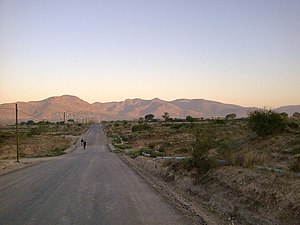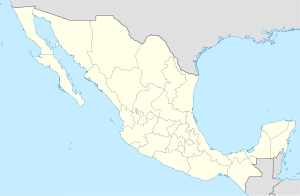Tecozautla (Otomi: Masofo) is a town and one of the 84 municipalities of Hidalgo, in central-eastern Mexico. The municipality covers an area of 575.6 km2. The name derives from the Nahuatl words "tetl", meaning "stone"; "cozaqui", meaning "yellow thing"; and "tla", meaning "place of"; making the entire meaning of Tecozautla "place where yellow earth abounds".[6]
Tecozautla | |
|---|---|
Municipality and town | |
 A road to Huitexcalco | |
| Coordinates: 20°32′N 99°38′W / 20.533°N 99.633°W | |
| Country | |
| State | 84 Municipalities of Hidalgo |
| Municipal seat | Tecozautla (municipality) |
| Government | |
| • Type | |
| • Municipal President | Joel Elías Paso (2020-2024) |
| Area | |
• Total | 575.6 km2 (222.2 sq mi) |
| Population (2005) | |
• Total | 31,609 |
| • Density | 72.4/km2 (188/sq mi) |
| Postal code | 42440[1] |
| Area code | 761[2] |
As of 2005, the municipality had a total population of 31,609.[7] In 2017 there were 2,415 inhabitants who spoke an indigenous language,[8] primarily Mezquital Otomi.[9] The town was declared a "Pueblo Mágico" in 2015.[6]
Toponymy
editThe name Tecozautla comes from the náhuatl tetl -stone-, cozauqui -yellow thing- and tla which means -place of-; which together means "Place where the yellow earth abounds".[note 1][10][11]
Geography
editRelief and hydrographic
editAs for physiography it is located within the province of the Neovolcanic Axis; within the subprovince of Sierras y Llanuras de Querétaro and Hidalgo.[12]
As for its geology it corresponds to the Neogene period (91.86%), Cretaceous (4.0%) and Quaternary (2.0%).[12] With Extrusive igneous type rocks: basalt (29.86%), acid tuff (26.0%), volcanoclastic (12.0%), basic tuff-basic volcanic breccia (5.0%), acid tuff-acid volcanic breccia (5.0%) and rhyolite-acid tuff (2.0%); sedimentary: sandstone–conglomerate (12.0%) and limestone (4.0%); soil: alluvial (2.0%).[12] Regarding pedology the dominant soil is phaeozem (45.86%), vertisol (26.0%), calcisol (19.0%) and leptosol (7.0%).[12]
With regard to hydrology it is positioned in the hydrological region of the Pánuco River; in the basins of the Moctezuma River; within the sub-basins of the Tula River (35.0%), San Juan River (30.0%), Tecozautla River (21.0%) and Alfajayucan River (14.0%).[12] It also has a dam, wells and springs.[13][14]
(14.0%).[12] It also has a dam, wells and springs.[13][14]
Weather
editThe following climates are located in the municipal territory with their respective percentage: Semi-dry semi-warm (54.0%) and semi-dry temperate (46.0%).[12] With an average annual climatological temperature of 17 °C with a total annual precipitation of 517 millimeters.[13]
Ecology
editThe flora in the municipality is made up of a variety of trees such as oak, oyamel, biznaga, pitaya, huizache, maguey, cactus, organ and a large number of pirul trees, and some fruit trees. [13] [14] The fauna is made up of rabbits, rattlesnakes, hares, squirrels, ocelots, hawks, opossums, armadillos, deer, chameleons, coyotes, buzzards, insects and arachnids.[13][14]
Notes
edit- ^ The etymological origin of the name of a
References
edit- ^ Correos de México. "Check Postal Codes". Ministry of Communications and Transport. Retrieved January 19, 2021.
- ^ Telmex. "LADA Keys Consultation". Teléfonos de México. Retrieved January 22, 2021.
- ^ Cite error: The named reference
MunicipalityErectionwas invoked but never defined (see the help page). - ^ Cite error: The named reference
History of Municipalitywas invoked but never defined (see the help page). - ^ Cite error: The named reference
INAFED-Governmentwas invoked but never defined (see the help page). - ^ a b Tourism, Secretariat of. "Tecozautla, Hidalgo". gob.mx. Retrieved 2021-05-25.
- ^ "Tecozautla". Encyclopedia of the Municipalities of Mexico. National Institute for Federalism and Municipal Development. Retrieved December 27, 2008.
- ^ "Basic Statistical Information: Tecozautla Municipal Folder" (PDF). Integral Information System of the State of Hidalgo. Secretaria de Planeación Desarrollo Regional Regional y Metropolitano. Archived from the original (PDF) on 30 December 2017. Retrieved 22 March 2017.
- ^ Báez Cubero, Lourdes; Garret Ríos, Gabriela; Pérez González, David; Moreno Alcántara, Beatriz; Fierro Alonso, Ulises Julio; Hernández García, Milton Gabriel (2012). Instituto Nacional de Antropología e Historia (ed.). Los pueblos indígenas de Hidalgo: Atlas etnográfico (PDF) (Primera ed.). México, D.F; México. pp. 32–35. ISBN 978-607-484-357-6.
{{cite book}}: CS1 maint: location missing publisher (link) - ^ State Center for Municipal Studies of the State of Hidalgo (1988). The Municipalities of Hidalgo. Encyclopedia Collection of the municipalities of Mexico. Ministry of the Interior.
- ^ "Tecozautla". Municipalities of Hidalgo. Government of the state of Hidalgo. Retrieved March 22, 2017.
- ^ a b c d e f g Cite error: The named reference
ProntuarioHidalgowas invoked but never defined (see the help page). - ^ a b c d e Cite error: The named reference
INAFEDwas invoked but never defined (see the help page). - ^ a b c d Cite error: The named reference
SIIEHwas invoked but never defined (see the help page).

